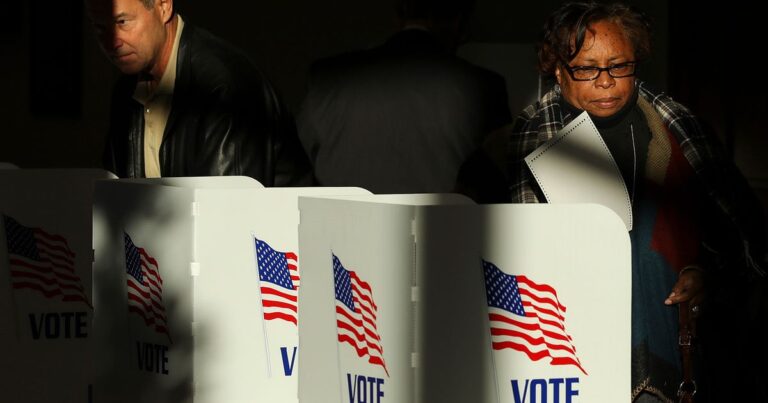If a call handed down by a conservative federal appeals courtroom final month is allowed to face, it should remove what stays of one of the crucial essential federal legal guidelines handed in my lifetime, the Voting Rights Act.
An eighth Circuit Courtroom of Appeals panel dominated that nobody however the federal authorities can sue to implement an essential a part of this important statute. And because the dissenting decide identified, solely 15 of the 182 profitable circumstances beneath the part over the previous 40 years have been introduced solely by the Division of Justice.
The Voting Rights Act has been remarkably efficient in countering the myriad legal guidelines and practices southern states have enacted to stop blacks from voting because the finish of Reconstruction. Voter turnout amongst black voters in Mississippi rose from 6% in 1964, the yr earlier than the legislation was handed, to 59% in 1969.
Part 2 of the Voting Rights Act prohibits state and native election practices and techniques from discriminating towards voters of shade. Congress strengthened the supply in 1982 in order that proof of intentional discrimination would now not be vital; it’s adequate to indicate discriminatory impact.
Even beneath the conservative Roberts Courtroom, Part 2 has offered essential protections towards racial discrimination in voting. This yr, for instance, in Allen v. Milligan, the courtroom discovered that Alabama had violated the Voting Rights Act by drawing congressional districts.
Alabama’s inhabitants is 27% black, however the state legislature had drawn congressional districts in order that just one in six had a black majority. The courtroom’s ruling that the districts violated Part 2 led to a brand new map with two majority-black districts.
Beneath the eighth Circuit’s 2-1 ruling, nevertheless, personal people and teams such because the ACLU and the NAACP Authorized Protection Fund couldn’t sue to implement § 2. A whole bunch of such circumstances have been filed, and plenty of have been determined by the Supreme Courtroom — amongst them Allen v. Milligan — with out being questioned on these grounds.
This newest menace to the Voting Rights Act comes a decade after the Supreme Courtroom struck down one other key side of the legislation, Part 5. Beneath that part, jurisdictions with a historical past of racial discrimination in voting must safe the approval of the U.S. Legal professional Common earlier than making important adjustments to their electoral techniques.
The courtroom declared this “preclearance” requirement unconstitutional in 2013, ruling 5 to 4 that singling out southern states for the restriction violated the precept of “equal state sovereignty.” States like North Carolina and Texas responded by rapidly enacting discriminatory voting practices that had beforehand been blocked.
The latest case arose in 2021, when the Arkansas NAACP and others challenged new statehouse districts. The plaintiffs argued that the Arkansas map diluted black voting energy in violation of Part 2 and that 5 extra majority-black districts ought to be drawn to pretty symbolize the state’s black inhabitants.
The bulk opinion by eighth Circuit Courtroom Choose David Stras, a Trump appointee, concludes that solely the USA authorities can deliver such circumstances, contradicting 58 years of follow because the Voting Rights Act grew to become legislation. Supreme Courtroom Justice Clarence Thomas, for whom Stras clerked, raised this risk in his Milligan dissent, however the prospect of such a radical change to the legislation was not taken significantly by many. In reality, neither celebration within the Arkansas litigation even raised the problem: the U.S. District Courtroom through which the case was first heard improperly raised the problem alone.
At greatest, the Division of Justice has the sources to deliver solely a handful of Part 2 lawsuits a yr. At worst, particularly beneath a conservative administration, it could deliver none.
In his dissent from the Courtroom of Attraction’s choice, Chief Justice Lavenski Smith rightly described the ruling as threatening main upheaval. “Rights so basic to self-government and citizenship,” he wrote, “shouldn’t rely solely on the discretion or availability of brokers of presidency for cover.”
As Smith famous, the Supreme Courtroom declared greater than two centuries in the past, in Marbury v. Madison, that the place there’s a violation of a proper, there should be a treatment. If the Supreme Courtroom doesn’t overturn the eighth Circuit’s choice, it should depart only a few treatments for violations of considered one of our most essential rights.

